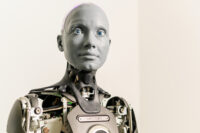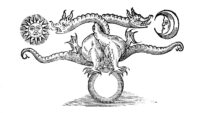In their desperation for reliable food and sustenance, some ancient peoples turned to human sacrifice. The shedding of blood was viewed as a way to satisfy the spirits or gods, who would then, they believed, provide food from the land. If a poor harvest ensued, caused by drought or heat, the assumption was made that the gods were unhappy, and people – including children – were sacrificed for the sake of a good harvest.
Today we view such behavior as primitive and cruel, the result of ignorance, superstition and fear. While we condemn such barbaric behavior, we simultaneously exalt our enlightened modern wisdom, considering ourselves to be civilized and humane.
Few of us grow our own food any more, and we understand that it’s weather and soil, not gods, that grow food. Agriculture’s a business, one of the largest in existence, and a global market has brought us blueberries in December. Whatever harvest meant to people in the past, today it’s money we harvest, which we call profit.
The harvest of profit goes well beyond food. Virtually every segment of modern life has been monetized. Air, sunshine and space are almost all that remain free of charge. The love of money clouds ethical judgment and in our rush to find fortune great harm has been done. Among the worst harm is done to our children.
Cancer causing agents and hormone disrupters, BPA (Bisphenol A) and pthalates, are used in the manufacture of polycarbonate plastics, plastics used in baby bottles, formula and baby food containers. There is no more vulnerable population than babies, whose bodies and brains rapidly develop after birth. The European Union banned these chemicals in food packaging years ago, but in the United States their use has been widespread. Only now have the major manufacturers decided to stop selling such products in the U.S., though callously, they will continue to sell them in other countries.
Many of the tens of thousands of chemicals used in manufacture may pose risks to children. The effects of long-term exposure to these chemicals are unknown, because they have been introduced without long-term testing. Our regulatory system tends to deem these chemicals safe until proven otherwise, and such proof is found among its unwitting victims. Children and babies are the least capable of complaining and by the time danger is discovered, the damage is done. Asthma, diabetes, and auto-immune diseases are increasing in children; exposure to untested toxic chemicals certainly is suspect.
There are those who believe that government regulation is bad, that business should be self-regulated. The argument goes that the public should choose what it wants to purchase, and that caveat emptor (“let the buyer beware”) and free unfettered markets work best. If this is true, then it is just as true that the purveyors of products that harm babies and children are criminals, and they should be brought before trial. If the buyer must beware, then so must the seller.
Shopping for baby food for our granddaughter Isabelle, my daughter e-mailed me recently, “I cried standing in the baby food aisle while looking at the ten shelves of baby food in plastic #7 tubs.”
So it seems modern civilization has not changed very much after all. For the sake of a good harvest, sadly, we continue to sacrifice children.
We welcome your feedback. For general feedback or to contact one of our columnists, please visit the Contact the Columnists Page at www.sonomasun.com.
For the sake of a good harvest
More from Public CitizenMore posts in Public Citizen »




